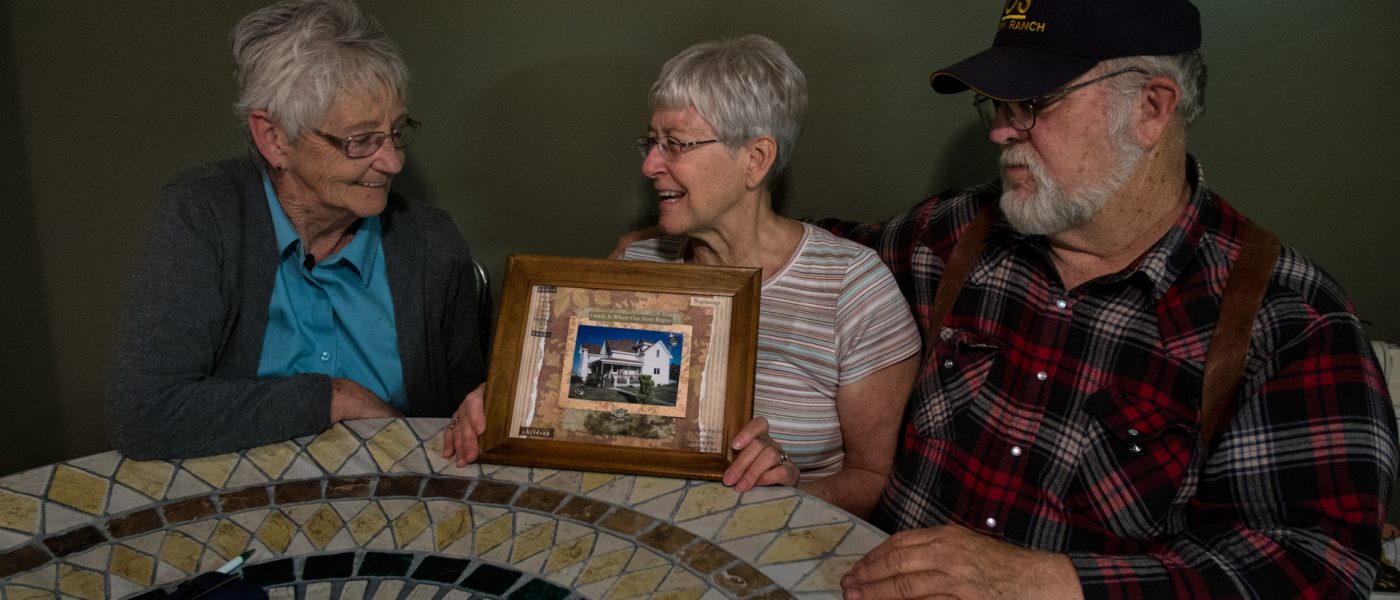This post comes to us from our friends at the Kansas Farmers Union. In it, Tom Parker talks about a powerful discussion among farmers and their allies about what they learned during the devastating 1980s farm crisis, that inspired the creation of Farm Aid. We’re proud to highlight the tireless efforts of these people we call Farm Advocates. They work one-on-one with individual farmers to help them navigate the complex world of farm lending, state and federal regulations, contracts, and government programs in a way that increases their chance to stay on the land and be successful.
Prior to a panel discussion on the 1980s farm crisis and its implications for the future, a documentary about the crisis was aired for members of the Kansas Farmers Union during their annual convention in early December. For the audience, some of whom lived through the events, it set a sobering tone to what would follow. For the panelists—Charlie Griffin, Ed Reznicek, Forrest Buhler and Linda Hessman—it presented an historical blueprint of shared knowledge that could prevent farmers, mediators and advocacy workers from making the same mistakes again.
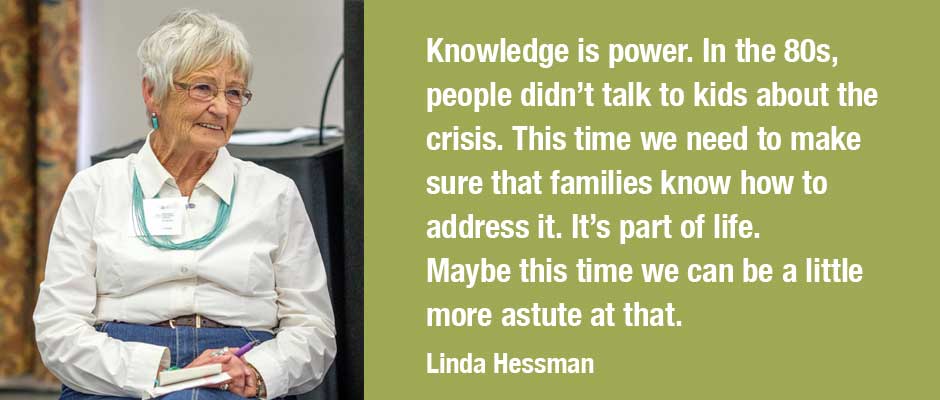
Griffin couldn’t help but feel a sense of déjà vu, and he was reminded of another documentary that opened his eyes to the cyclical nature of crises and humanity’s penchant for forgetting.
He was manning phones at the Farm Crisis Hotline when an old man hobbled through the door. The man introduced himself as Wendell Hoffmann, formerly a cameraman for CBS, and said he wanted to discuss the farm crisis of 1963. With him were three large spools of film that he had shot for a CBS special on the crisis.
Griffin, engulfed at the time with the farm crisis of 1986, wasn’t aware of a farm crisis in 1963. He would have been 13 years old then, and life on the family farm near Lyons, Kan., had seemed perfectly ordinary. At any rate, his parents had never discussed any crisis in front of the children.
As he watched the film, though, Griffin was increasingly stunned at its implications, as well as its personalized focus. One segment showed his neighbor standing in the bed of a grain truck with the Griffin farm visible in the distance. Another segment panned down Main Street of Lyons, Kan., where he could see his parents’ car parked in front of the J.C. Penny store. It wasn’t so much that it happened, nor that it happened in his own backyard, to neighbors and friends and, perhaps, even to his own parents, but that it happened without his cognizance.
“I had no idea,” he said. “I was oblivious to it. But it gave me a history to think about the recurring cycles of crisis that agriculture has gone through in this country. That’s the value of looking back in time.”
“Life is lived forward but understood backward. It’s important to learn from each other, to be aware of our neighbors.”
More than two decades later, he recognized his own shock in the faces of young farmers after facilitating another panel discussion on the 1980s farm crisis. Afterward, several farmers told him that they had no idea that it had happened. One said, “We need to understand it so we don’t have to live through it again.” And, as if an echo across time and space, he heard the same thing repeated at a meeting last summer.
It was, Griffin learned, a common but misguided fault among farm families. That self-imposed silence, meant as a protective measure, in turn had the opposite effect, leaving families vulnerable to the next crisis. Collectively, it amounted to a generational amnesia.
Hessman agreed. “If there is one thing that can do us in, it is silence,” she said. “Life is lived forward but understood backward. It’s important to learn from each other, to be aware of our neighbors. We have to learn as a group, and to not wait too long, because the guy down the road is starting to experience the same thing. We cannot afford to let that happen again.”
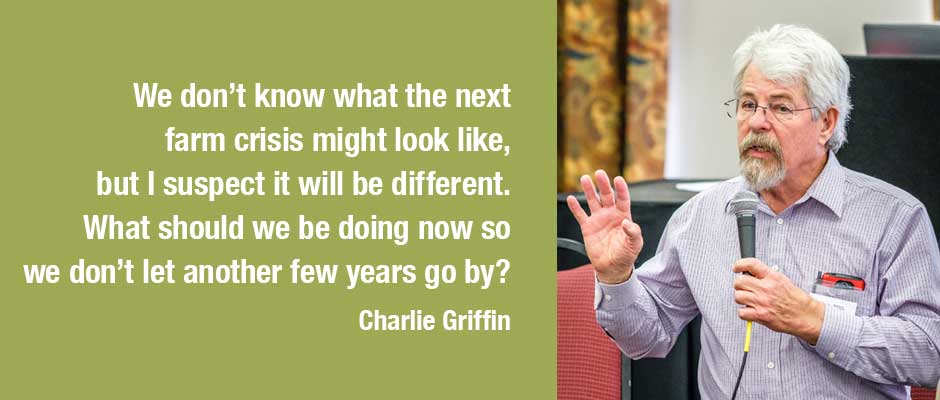
The discussion, “Responding to the Next Farm Crisis,” was both a primer and a call to action from speakers who had either farmed through the crisis or performed advocacy work. They included Griffin, who served as Assistant Director of Kansas Farmers Assistance, Counseling and Training Service form 1985 to 1994, and as Director of the Kansas Rural Assistance Helpline from 2001 to 2010; Hessman, a farmer and rancher from Dodge City, a Certified Mediator specializing in agricultural issues, and a national Farm Aid Advocate; Reznicek, a Nemaha County rancher and organic farmer who worked as a paralegal for Kansas Legal Services from 1978 to 1983, assisting farmers to develop debt and loan restructuring plans and negotiating with creditors to enable farmers to continue their operations, and continued that work with the Kansas Rural Center from late 1983 to 1988; and Buhler, staff attorney for Farmers Assistance Counseling and Training Service from 1987 to 1995, and staff attorney for Kansas Agricultural Mediation Services since 1995.
With so much uncertainty over the future, the panelists agreed, it was time to reiterate the lessons that were learned from the front lines of the ‘80s crisis. “We don’t know what the next farm crisis might look like,” Griffin said, “but I suspect it will be different. What should we be doing now so we don’t let another few years go by?”
One of the most important considerations is to keep the lines of communication open, several panelists said.
“Knowledge is power,” Hessman said. “In the eighties, people didn’t talk to kids about the crisis. This time we need to make sure that families know how to address it. It’s part of life. Maybe this time we can be a little more astute at that.”
Networking was at the top of Buhler’s list of concerns. Last summer an ag economist told him that there were four ways to survive and endure the cycle. The top priority was communication, first with your spouse and then with your lender. Education and training were also on the list. Unfortunately, he said, we’ve lost the ability to network.
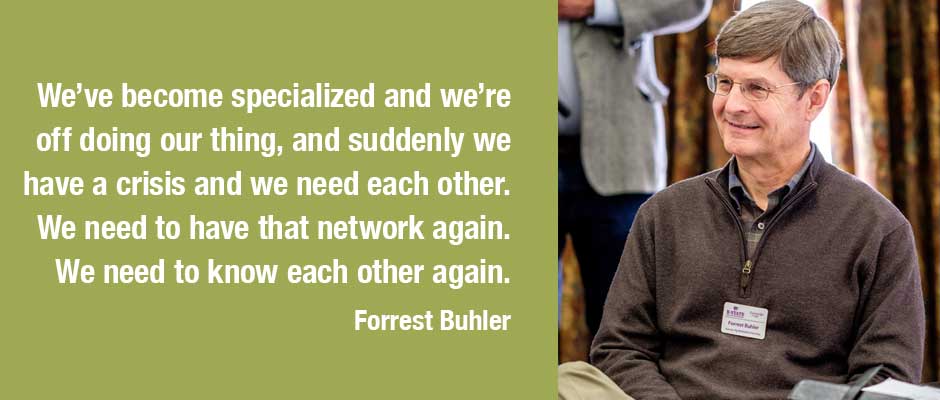
“We’ve become specialized and we’re off doing our thing, and suddenly we have a crisis and we need each other,” Buhler said. “We need to have that network again. We need to know each other again.”
Recognizing the mental health aspect and having systems in place for mitigation are also critical, he said. Many of the programs and legislation that came out of the 1980s are still in existence, including programs such as the Kansas Ag Mediation Services that moderates discussions between farmers and lenders and can provide mediators, number crunchers and a staff of attorneys.
“So some very positive things came out of the crisis,” he said. “But farmers still cry on the phone. It still doesn’t go away. It’s still a difficult situation. That’s why mental health aspect is so important to this process. How do you help people get through the emotional stuff? We’re missing that right now.”
Griffin agreed. “We were fortunate in the eighties to be able to pull together a farm crisis hotline and have a network of people across the state in church settings, ministers who were good pastoral counselors, and some of the rural community health centers that stepped up to help,” he said. “Today I don’t even know where to refer someone for help like that, somebody who understands farm culture. We need to rebuild that system.”
As the mental health expert of the panelists, Griffin said that his experience has shown that people who come to events like the convention or join organizations and communicate to others are able to handle crisis much more effectively than people who isolate themselves at home. “The first thing to do is to take care of yourself,” he said. “The second thing is to keep an eye on the family and make sure you communicate well. Pay attention to friends and neighbors, and invite them to events or to join local activities.”
Reducing debt dependency and input costs are two ways to weather a financial crisis, Reznicek said. Farmers have always had a tendency to over-fertilize, so now is a good time to invest in soil tests. When prices fall below the cost of production, consider reducing costs instead of producing extra yield. Diversifying is also something to strive for.
“We’ve heard a lot about diversity over the years, about cover crops and soil health,” he said. “They are not always easy to implement. It’ll be interesting to see if those folks are better situated to handle financial difficulties than those who haven’t done those things. There are people who are wondering if they should sell assets now while the price is maybe better than in two or three or four years. These are difficult questions to ask, and difficult decisions to make.”
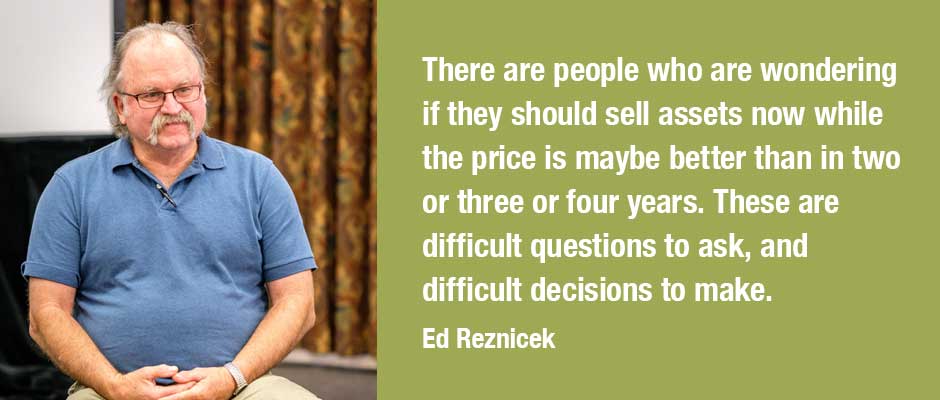
Griffin was reminded of a rancher from southeast Kansas that he had met at a graziers conference a few years back. The man told him that he had a detailed system for managing his grasslands that was based on the amount of rain that fell, in which month it fell, and the amount of plant growth and dry matter that was available for his cows to graze on. It was further broken down into Plan A, Plan B and Plan C. Plan A was to maintain the full level of his operation if there was an abundance of water and grass. Plan B had a firm cutoff date whereby if the ranch didn’t get enough water by then, he would sell part of his herd. Plan C was focused on conditions in August—if they were real bad, he needed to ask himself himself how deep into debt he would be willing to go.
“All of us need to be thinking about that,” Griffin said. “We don’t know what the next farm crisis will be, we’re just speculating. Tom Giessel, a Larned farmer, commented that he didn’t see any reason to be optimistic about the next few years—at least. Every one of us needs to think through a Plan A, a Plan B and a Plan C so we don’t get caught saying, ‘I don’t know what to do. I’m up against the wall.’ You should build it into family discussions and your year by year farm planning. You should have a backup.”
The convention, whose theme was “Helping Communities Help Themselves,” was sponsored by Midwest Regional Agency, Farmers Union Insurance and the Kansas Center for Sustainable Agriculture and Alternative Crops. Kansas Farmers Union is the state’s oldest active general farm organization working to protect and enhance the economic interests and quality of life for family farmers, ranchers and rural communities.
"Homeplace Under Fire"
Our documentary film Homeplace Under Fire tells the story of the grassroots work of American farm advocates and their thirty-year fight to keep family farmers on the land. Watch the trailer and learn more.
